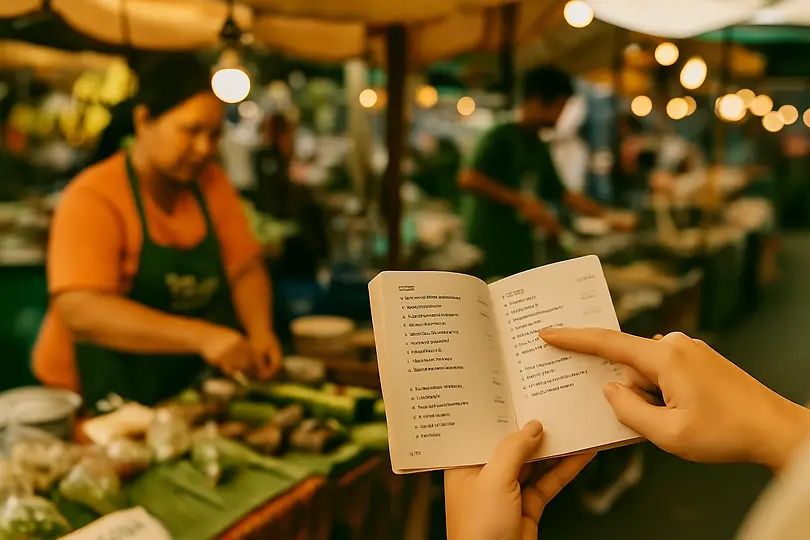
Essential Thai Terms
A little local language goes a long way in Thailand. These commonly used words and phrases will not only help you navigate daily interactions, they also offer insight into the culture’s easy-going, respectful spirit.

-
Wai (ไหว้)
A traditional Thai greeting: palms pressed together in a prayer-like position, paired with a slight bow. Commonly used for saying hello, thank you, or goodbye. Returning the gesture is a sign of respect, especially in formal or polite settings.
-
Baht (บาท)
Thailand’s official currency (symbol: ฿). While digital payments are growing, cash is essential in local markets and smaller towns. Carry smaller denominations when possible.
-
Wat (วัด)
A Buddhist temple or monastery. These are sacred spaces. Dress modestly, remove your shoes before entering, and act respectfully at all times.
-
Khop khun ka / krap (ขอบคุณค่ะ / ครับ)
"Thank you."
Ka is used by women, krap by men. Typically spoken with a smile, a soft tone, and often accompanied by a wai.
-
S̄wạs̄dī ka / krap (สวัสดีค่ะ / ครับ)
"Hello" or "Goodbye."
A polite, everyday greeting appropriate in almost every situation. Use with a wai for extra warmth.
-
Sabai (สบาย)
Means comfortable, relaxed, or well. You’ll often hear sabai sabai, a phrase that captures Thailand’s chilled, easy going spirit.
-
Songthaew (สองแถว)
A shared pickup truck taxi with two bench seats in the back. Common in smaller towns and islands. Cheap, reliable, and a fun local experience.
-
Tuk-tuk (ตุ๊กตุ๊ก)
A three-wheeled motorised rickshaw. Great for short rides in urban areas. They’re noisy, fun, and iconic, but agree on the fare before hopping in.
-
Farang (ฝรั่ง)
A commonly used word for foreigners, especially Westerners. Usually neutral, but like many things, tone and context matter.
-
Sanuk (สนุก)
Fun, enjoyment, or the pleasure of doing something with joy. A key cultural value, if it’s not sanuk, it’s not worth doing.
-
Mai pen rai (ไม่เป็นไร)
"It’s okay", "Never mind", or "No problem." A phrase that captures the Thai mindset of patience, acceptance, and going with the flow.
-
Sak Yant (สักยันต์)
Traditional sacred tattoos often applied by monks or tattoo masters using a bamboo stick or metal rod. These designs are spiritual, symbolic, and steeped in ritual.
-
Mak (มาก)
Means “very.” Used to intensify adjectives, such as aroi mak, “very delicious.”
-
Aroi (อร่อย)
Delicious. Say it after a meal and you’ll often be met with smiles and pride. It’s one of the most useful words you’ll learn.




